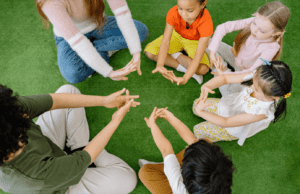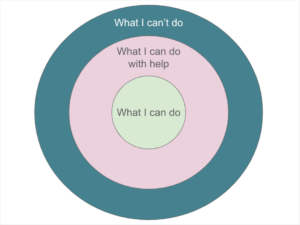Conversations play a crucial role in children’s development, especially when guided with purpose. By using well-designed questions during discussions, we can greatly enhance a child’s social and emotional development. This approach, which we can call “guided conversations,” blends structured questions with child-centred dialogue, offering both direction and engagement. This balanced approach is essential for helping children navigate complex social and emotional situations.
Globally, schools use curriculum areas such as the UK’s PSHE (Personal, Social, Health, and Economic), the U.S.’s SEL (Social and Emotional Learning), and Circle Time, as well as Life Skills Education and Restorative Practices, to advance children’s social and emotional growth through structured dialogues. These methods aim to enhance children’s interpersonal abilities, self-awareness, and emotional intelligence, creating a supportive environment for guided conversations.
The Core of Guided Conversations
Guided conversations involve the use of structured prompts or questions to steer children’s discussions in meaningful directions. This method taps into children’s natural curiosity and their capacity for imaginative thinking, guiding them to explore topics that might not come up in unstructured conversations. The questions prompt critical thinking, empathy, and clear expression of thoughts and feelings.
For example, to help foster children’s emotional resilience, the teacher or parent might ask:
Without naming them, think of someone who was unkind to you. What in their life might have made them act like that?
If you ever feel you’re not good enough, what’s a super awesome thing you’ve done that makes you feel really good about yourself?
Your lunch buddy sits with someone else today. How does that feel? How can it be positive?
Similarly, the following questions could help to develop children’s conflict resolution skills:
You are not happy with the quality of school meals. How can you share these feelings with your head teacher in a helpful way?
A classmate looks at your work and says their baby sister could do better. How can you handle this situation calmly and not let the comment upset you?
Thinking about past arguments, what can you learn from those moments?
Emotional Growth within a Supportive Structure
Guided conversations foster interpersonal skills and social norms like turn-taking, active listening, and appreciating diverse perspectives. Moreover, the guided nature of the conversation ensures inclusivity and accessibility, fostering a sense of community and belonging among participants.
The Role of Facilitators in Guided Conversational Interactions
Facilitators, whether educators, therapists, or parents, play a critical role in maximising the benefits of guided conversations. By selecting or crafting questions that are open-ended and reflective, facilitators can tailor the conversation to the developmental level and interests of the children. Active listening and empathetic responses enrich the dialogue, providing validation and guiding the conversation to deeper levels of understanding and connection.
Guided conversational interactions can be seamlessly integrated into diverse settings, each offering unique opportunities for social and emotional development. In educational environments, teachers can use question-based activities to foster a reflective and inclusive classroom culture. At home, families can incorporate structured discussions into daily routines, turning ordinary moments into opportunities for meaningful connection and growth.
Relevant Research:
-
Vygotsky’s Sociocultural Theory
Lev Vygotsky, a pioneering Russian psychologist in the early 20th century, revolutionised our understanding of how social interactions and cultural contexts drive cognitive development. His Sociocultural Theory posits that learning is intrinsically social, with critical mental functions emerging from these interactions. Central to his theory is the Zone of Proximal Development (ZPD), which highlights the learning potential between a child’s independent capabilities and what they can achieve with guidance. Vygotsky’s concept of scaffolding—providing tailored support to learners—alongside the role of language as a key mediating tool, underscores the transformation of social exchanges into cognitive growth, a process he termed “internalisation.”
Vygotsky’s insights have profound implications for education, advocating for interactive, dialogue-rich environments that challenge learners within their ZPD. Structured conversational tools, like guided questions, are practical applications of his theory, fostering reflective thinking and deep learning within supportive social contexts. These interactions not only enhance cognitive and social development but also cultivate essential skills like empathy and effective communication. Ultimately, Vygotsky’s work underscores the critical role of social engagement in learning, championing structured dialogues as a means to bolster holistic growth in children’s cognitive, social, and emotional realms.
-
The Theory of Mind
The Theory of Mind (ToM), a cornerstone of cognitive psychology, delves into our capacity to understand and attribute mental states like beliefs, desires, and emotions to ourselves and others, playing a vital role in social interactions and empathy. Introduced by David Premack and Guy Woodruff in 1978, the concept has since been pivotal in exploring how humans perceive others’ mental states, with significant contributions from researchers like Simon Baron-Cohen and Alison Gopnik. Baron-Cohen’s “Sally-Anne test” notably assesses children’s ability to grasp false beliefs, a key ToM milestone typically reached by ages 4 to 5.
ToM development starts in infancy, with joint attention laying the early groundwork, evolving into more complex understandings of others’ emotions and perspectives. This development is crucial for effective communication and social interaction, enabling children to appreciate diverse viewpoints and navigate complex social scenarios.
Conversational tools that facilitate discussions on thoughts, feelings, and perspectives significantly enhance ToM skills, fostering empathy and social reasoning. By engaging in dialogues that challenge them to consider various viewpoints and predict emotional responses, children develop a nuanced understanding of mental states, contributing to their emotional intelligence and social adeptness. Thus, structured conversations play a crucial role in supporting the intricate development of ToM, laying the groundwork for empathetic and socially nuanced interactions.
-
Emotional Intelligence and Regulation
Emotional Intelligence (EI) and emotional regulation, key facets of psychological research, are essential for personal success, mental health, and interpersonal dynamics. Introduced by Peter Salovey and John D. Mayer in the 1990s and popularised by Daniel Goleman, EI encompasses the ability to perceive, use, understand, and manage emotions effectively. Goleman’s model outlines five domains: self-awareness, self-regulation, internal motivation, empathy, and social skills, which are foundational for navigating emotional landscapes.
James J. Gross’s work on emotional regulation shows how people handle emotions. These ideas are important in structured conversations, where discussing emotions can boost emotional intelligence. For instance, talking about emotional reactions, considering how emotions affect decisions, understanding different feelings, and planning how to regulate emotions can all improve emotional understanding and management.
Such dialogues not only improve the ability to recognise and interpret emotional cues but also strengthen empathy and social skills, contributing to more effective emotional regulation. Therefore, structured conversational interactions serve as powerful tools for developing emotional intelligence, fostering self-awareness, and enhancing interpersonal relationships, thereby supporting healthier emotional functioning.
-
Empirical Studies on Questioning Techniques
Research on questioning techniques emphasises their crucial role in improving learning, thinking, and social interaction. Studies by experts like Benjamin Bloom, Arthur Graesser, and Mary Budd Rowe demonstrate how well-designed questions can enhance critical thinking, understanding, and engagement. Bloom’s Taxonomy, for example, organises cognitive skills and guides the creation of questions ranging from basic recall to advanced analysis, promoting deeper learning. Graesser’s Question Answer Relationship (QAR) framework shows that questions encouraging inference lead to deeper engagement compared to simple recall-based questions.
These studies collectively reveal that the type of questions asked, the time allowed for responses, and the follow-up contribute significantly to the learning process. They advocate for a mix of question types in educational tools, emphasising the need for questions that stimulate deeper analytical and reflective thinking. Additionally, the research points to the importance of allowing pauses for thought and providing feedback that extends understanding, thereby making conversational interactions more meaningful and productive.
Incorporating these insights, conversational tools can be designed to support a wide range of cognitive abilities and learning objectives, making them a powerful aid in personal and educational development. By fostering a dialogic environment that encourages reflection and critical thinking, these tools can significantly enhance learners’ engagement and comprehension, contributing to their overall growth.
Concluding thoughts…
Guided conversational interactions represent a powerful strategy in supporting the social and emotional development of children. By using structured questions as a foundation for dialogue, children are invited into a world of exploration, reflection, and connection. This approach not only enhances their communication skills but also fosters empathy, emotional intelligence, and social aptitude, equipping them to thrive in the intricate dynamics of human relationships.










